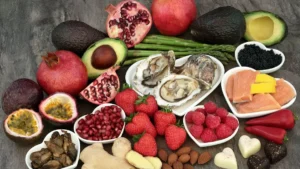Table of Contents
Introduction: The Quest for Natural Aphrodisiacs
For centuries, cultures worldwide have sought foods to enhance desire and intimacy. While modern science often debunks folklore, emerging research reveals surprising connections between nutrition and sexual health. This article challenges oversimplified claims about aphrodisiacs while highlighting evidence-based strategies for improving intimacy through diet and lifestyle.

Aphrodisiac Foods: Separating Myth from Science for Enhanced Intimacy
What Are Aphrodisiacs? A Complex Interplay of Culture and Biology
Contrary to popular belief, aphrodisiacs work through multiple pathways:
Physiological Mechanisms
- Vasodilation (improving blood flow)
- Hormone modulation (testosterone/estrogen balance)
- Neurotransmitter stimulation (dopamine, serotonin)
Cultural Symbolism
The placebo effect plays a significant role, as demonstrated in studies of perceived aphrodisiac efficacy.
Beyond the Hype: Critical Perspectives on Aphrodisiac Claims
The Limitations of Single-Ingredient Focus
Nutritionists emphasize that sexual health depends on overall dietary patterns rather than individual “magic” foods. A Mediterranean-style diet rich in plants, healthy fats, and lean proteins provides better support than isolated aphrodisiacs.
The Psychological Dimension of Aphrodisiacs
Stress reduction techniques may outperform traditional aphrodisiacs. A 2022 APA study found mindfulness practices increased sexual satisfaction by 31% compared to dietary interventions alone.
Top 12 Science-Backed Aphrodisiac Foods
1. Dark Chocolate (70%+ Cacao)
Contains phenylethylamine and flavonoids shown to improve circulation. A 2020 AHA study demonstrated improved peripheral blood flow in chocolate consumers.
2. Pistachios
Rich in arginine, a precursor to nitric oxide essential for vascular health. Clinical trials show improved erectile function scores with regular consumption.
Lifestyle Factors That Influence Sexual Health
Sleep Quality and Libido
Chronic sleep deprivation reduces testosterone by up to 15% in men (Journal of the American Medical Association, 2011).
The Dark Side of Aphrodisiac Drugs: Risks Beyond the Label
FDA warnings reveal 68% of OTC sexual enhancement supplements contain undeclared pharmaceuticals. Safer alternatives include…
Holistic Approaches to Sexual Wellness
Combining evidence-based nutrition with stress management and relationship counseling creates sustainable improvements in intimacy.
Conclusion: Empowerment Through Informed Choices
While certain foods show promise for supporting sexual health, lasting intimacy requires addressing physical, emotional, and relational factors. Consult healthcare providers for persistent concerns about erectile dysfunction or low libido.